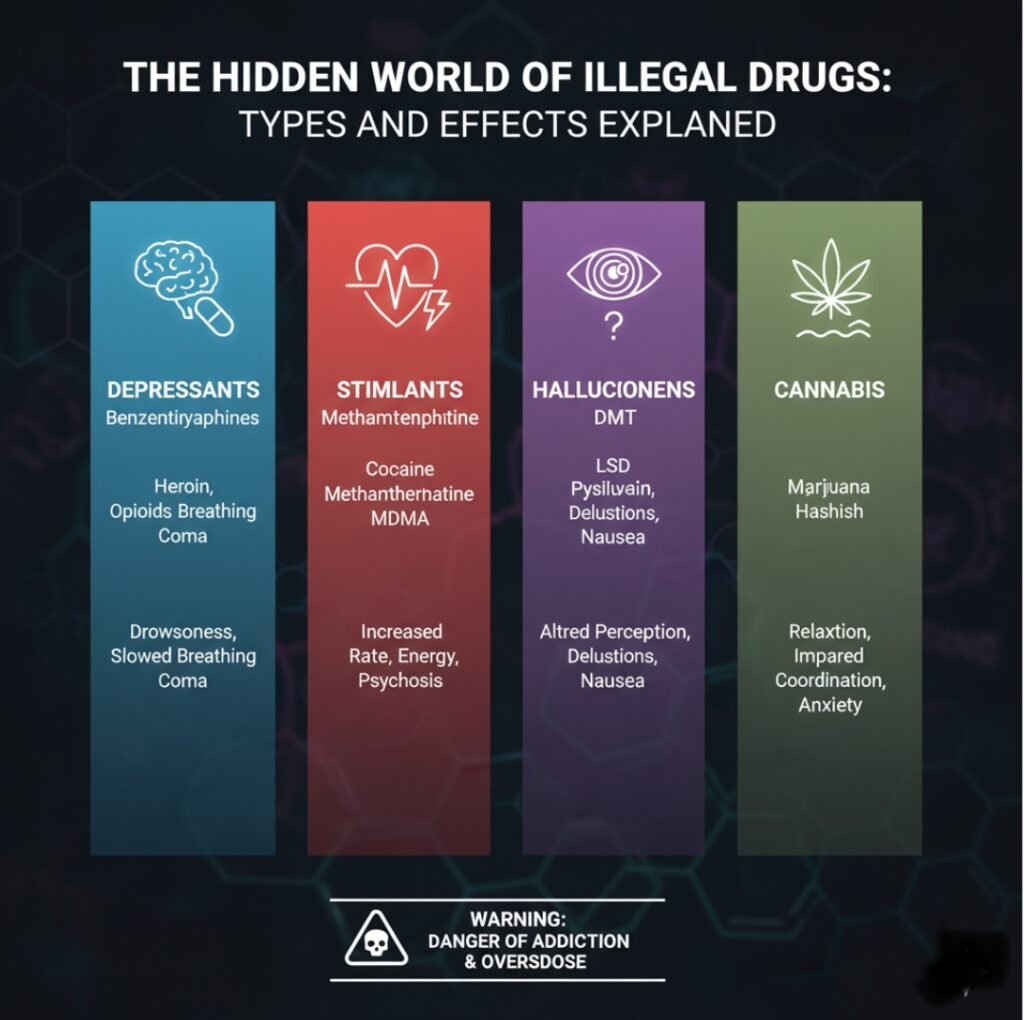Illegal drugs have long been a subject of fascination, fear, and controversy. Despite widespread awareness campaigns, their use remains a global issue, affecting individuals, families, and communities. Understanding the types of illegal drugs and their effects is essential not only for prevention but also for informed conversations about health and safety. In this article, we’ll explore the major categories of illegal drugs, how they impact the body and mind, and why awareness is key.
Stimulants: The Energy Boosters
Stimulants are drugs that increase alertness, energy, and attention by stimulating the central nervous system. Common examples include cocaine, methamphetamine, and MDMA (commonly known as ecstasy). These substances can create intense feelings of euphoria, increased confidence, and heightened physical energy.
However, the effects come with serious risks. Stimulants can raise heart rate and blood pressure, increasing the likelihood of heart attacks and strokes. Long-term use may lead to severe anxiety, paranoia, and addiction. Methamphetamine, in particular, can cause significant neurological damage, leading to memory loss and behavioral changes.
Depressants: Slowing the Body Down
Depressants, also known as sedatives, slow down the functioning of the central nervous system. They are often used illegally for their relaxing and calming effects. Common examples include heroin, GHB, and illegal use of prescription medications like benzodiazepines.
Depressants can reduce anxiety, promote sleep, and create a sense of euphoria. However, they are highly addictive and can cause dangerous side effects. Overdoses can lead to slowed breathing, coma, and even death. Mixing depressants with alcohol or other drugs significantly increases these risks.
Hallucinogens: Altering Reality
Hallucinogens are a class of drugs that distort perception, thought, and mood. They cause users to experience hallucinations—seeing or hearing things that aren’t real. Common hallucinogens include LSD, psilocybin mushrooms, and PCP.
The appeal of hallucinogens often lies in the altered states of consciousness they provide.
Users may feel a heightened sense of creativity, spiritual insight, or emotional release. However, the effects are unpredictable. Hallucinogens can trigger severe anxiety, paranoia, and psychotic episodes, especially in individuals with pre-existing mental health conditions. Long-term psychological effects, though less common, can persist for months or years in some users.
Opioids: Pain Relief and Addiction Risks
Opioids are substances derived from the opium poppy or synthesized to mimic its effects. Heroin is the most notorious illegal opioid, while some prescription opioids are also misused. These drugs bind to receptors in the brain and spinal cord, producing intense pain relief and feelings of euphoria.
While opioids can create a powerful sense of well-being, they are extremely addictive. Even short-term use can lead to dependence, and overdoses are a leading cause of death in many countries. Symptoms of opioid overdose include slowed breathing, loss of consciousness, and, if untreated, death. Awareness and access to life-saving treatments, such as naloxone, are critical in combating the opioid crisis.
Cannabis: The Controversial Green Leaf
Cannabis occupies a unique space in discussions about illegal drugs. While it remains illegal in many regions, some countries and states have legalized its recreational or medical use. Cannabis contains compounds like THC that affect the brain, producing relaxation, altered perception, and sometimes euphoria.
Although often considered less harmful than other illegal drugs, cannabis use is not without risks. It can impair memory, concentration, and coordination. Heavy or prolonged use may lead to dependency and, in some cases, mental health issues like anxiety or psychosis, particularly in vulnerable individuals.
Why Awareness Matters
Being aware of the various types of illegal drugs and their effects is essential for making informed choices. This knowledge can help individuals recognize potential dangers, steer clear of risky behavior, and offer support to loved ones facing addiction challenges. In cases where someone faces legal trouble, consulting a drug possession lawyer in Utah can provide crucial guidance. Alongside professional help, education campaigns, community programs, and open conversations about drugs remain vital tools for reducing harm and promoting safety.
In Conclusion
Illegal drugs are more than just a headline—they are a complex social and health issue with wide-reaching consequences. From stimulants that rev up the body to depressants that slow it down, hallucinogens that warp reality, opioids that mask pain, and cannabis with its controversial status, each substance carries unique risks. Knowledge, awareness, and empathy are key in navigating this hidden world safely.
Experienced SEO Specialist and Web Developer with a strong focus on off-page SEO and guest posting. With 3 years of proven expertise, I help businesses improve their search rankings and build sustainable online presence.
